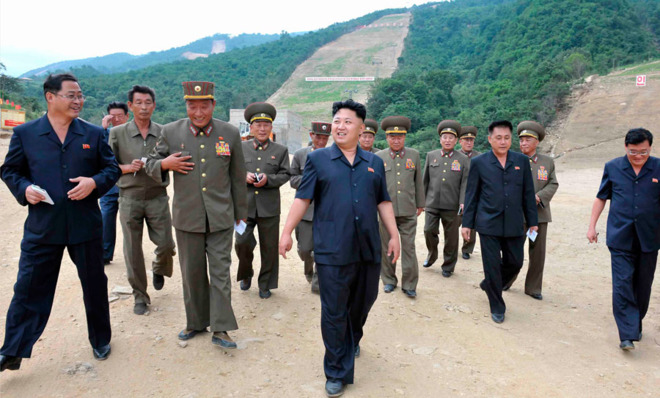The next hot ski destination: North Korea?
Tourism is unexpectedly growing in the Hermit Kingdom. But will North Korean citizens benefit?

A free daily email with the biggest news stories of the day – and the best features from TheWeek.com
You are now subscribed
Your newsletter sign-up was successful
Forget the Swiss Alps, Kim Jong Un wants you to ski the sunny slopes of Masik Pass, North Korea's new multimillion-dollar ski resort.
The result of 10 months of labor and scheduled to open sometime in October, the resort will offer ski runs, resort chalets, and even sleigh rides, providing fun for the country's estimated 5,500 skiers (about 0.02 percent of the population) and, increasingly, tourists.
Earlier this month, the Associated Press painted a picture of an idyllic scene, complete with "rugged mountain terrain, small farming hamlets, and lush foliage – beauty untouched by modern development," except for the loudspeakers blasting "patriotic music into the crisp mountain air."
The Week
Escape your echo chamber. Get the facts behind the news, plus analysis from multiple perspectives.

Sign up for The Week's Free Newsletters
From our morning news briefing to a weekly Good News Newsletter, get the best of The Week delivered directly to your inbox.
From our morning news briefing to a weekly Good News Newsletter, get the best of The Week delivered directly to your inbox.
That sounds a lot nicer than North Korea's brutal gulags, which, according to the latest U.N. report, are home to up to 200,000 prisoners. Considering the publicity Kim has given the country's new ski resort, along with its recently opened water park, it's obvious that North Korea is looking for some good PR — and it just might be working.
Tourism in the Hermit Kingdom is reportedly on the rise. In March, after a weeklong visit, Ian Steadman of Wired UK described the North Korean tourism industry as "slick, unexpectedly professional, and — as far as money-generating things go in the DPRK — relatively large."
Of course, the fact that you can go skiing in North Korea doesn't settle the question of whether you should go skiing in North Korea. Clarissa Sebag-Montefiore of The New York Times, who visited the country last month, acknowledged the moral complications of spending tourist dollars in a country accused of "crimes against humanity."
Still, she wrote, "Tourism has one big advantage: It broadens North Koreans' contact with the outside world, providing a glimpse, however small, of an alternative universe."
A free daily email with the biggest news stories of the day – and the best features from TheWeek.com
That is more or less the argument used by former Chicago Bulls star Dennis Rodman, who made headlines by visiting Pyongyang with several Harlem Globetrotters and a VICE video crew on a "basketball diplomacy" mission in February.
Robin Trudge, writing in The Guardian, gave a few other reasons why he doesn't feel bad about visiting North Korea several times since 2002:
Building a tourist industry provides jobs for locals who'd otherwise be working in bomb factories, if they had work at all. It diversifies the North Korean economy away from weapons' exports. It provides and demands skills ranging from designing and building quality accommodation to the people skills required in servicing hotels guests, and brings in investment in infrastructure, roads, railways, airports, health facilities and food supply chains that ever more areas will seek to benefit from as they open up to visitors.
All in, tourist dollars help to expand the economy and create dependents at every level on tourist dollars, which creates a great incentive not to go around starting wars. [The Guardian]
Few would argue for a less open North Korea. It's Kim's reclusiveness that essentially makes him a wild card, causing him to be less responsive to international pressure than other autocratic regimes.
That doesn't take away from the moral queasiness associated with spending money there. Asked earlier this month by The Huffington Post UK whether tourists should visit the country, Kim Young Soon, who saw her family die while spending nine years in a forced labor camp, responded, "If the money goes to help the people of my country, then yes, but we all know that will not happen."
Ken Kato, director of Human Rights in Asia, argued to German news organization Deutsche Welle in March that tourists should be restricted by the same U.N. sanctions that prevent businesses from investing in North Korea. Supporting the country's human rights abuses and pursuit of nuclear weapons with Western dollars, he argued, isn't offset by the potential gains of exposure to tourists.
"If people in Europe had known what had been happening in Nazi Germany in 1938 or 1939, they would not have gone there on their holidays," he said. "It's just unimaginable."
Keith Wagstaff is a staff writer at TheWeek.com covering politics and current events. He has previously written for such publications as TIME, Details, VICE, and the Village Voice.
-
 The Week Unwrapped: Do the Freemasons have too much sway in the police force?
The Week Unwrapped: Do the Freemasons have too much sway in the police force?Podcast Plus, what does the growing popularity of prediction markets mean for the future? And why are UK film and TV workers struggling?
-
 Properties of the week: pretty thatched cottages
Properties of the week: pretty thatched cottagesThe Week Recommends Featuring homes in West Sussex, Dorset and Suffolk
-
 The week’s best photos
The week’s best photosIn Pictures An explosive meal, a carnival of joy, and more